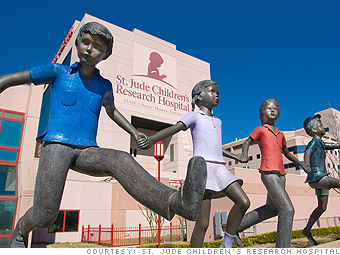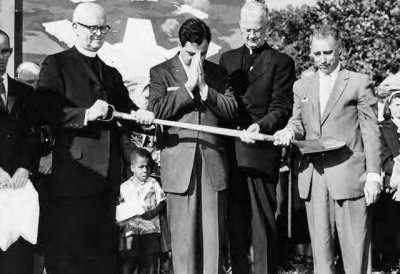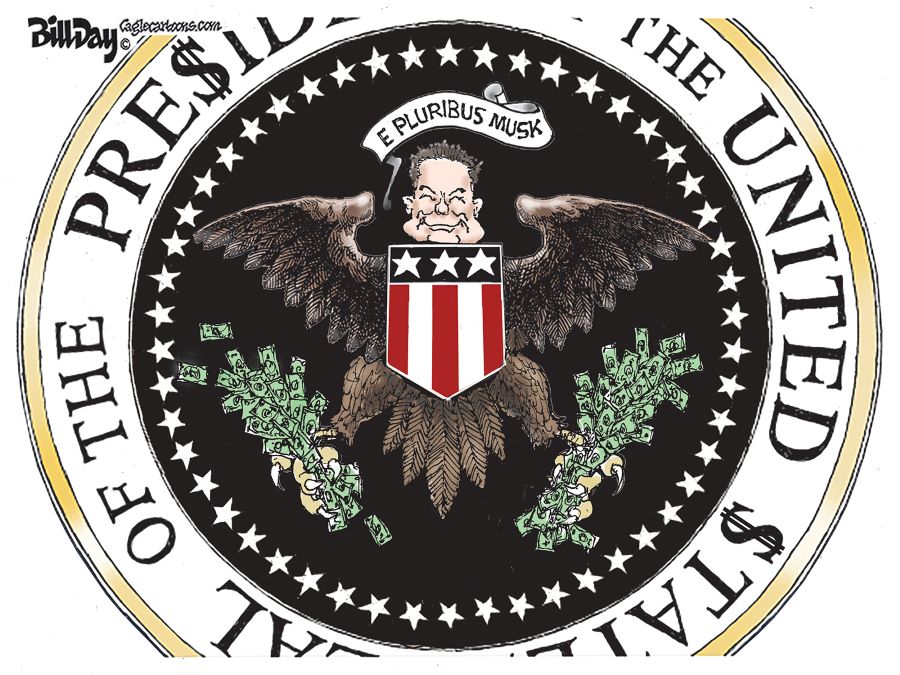It seems like a good time – in the midst of all the overheated rhetoric and political grandstanding – for all of us in this community to be thankful for our debt to Arab Americans who formed in 1957 the American Lebanese Syrian Associated Charities (ALSAC).
ALSAC’s only purpose is to act as the exclusive fundraising arm for St. Jude Children’s Research Hospital, and it raises more than $500 million annually for the hospital through its more than 30,000 fund-raising activities.
Because of ALSAC, St. Jude can make announcements like the recent one about its $1.2 billion expansion that will add 2,000 more employees over the next six years, expanding its impact on the fight against catastrophic childhood diseases worldwide. The strategic plan for 2016-2021 for the hospital calls for a total of $9 billion in new investments and payrolls.
The operating cost at St. Jude Children’s Research Hospital is approximately $2 million a day, and 75% per cent of the money for it comes from private donations from nine million active donors. And in keeping with the dream of its founder, Danny Thomas, no family ever receives a bill from St. Jude for treatment, travel, housing or food, so their entire focus can be on helping their child live.
From Immigrant Families
From dinners and meetings with Danny Thomas, founder of St. Jude Children’s Research Hospital, we remember his constant good humor and his sincerity when explaining how the hospital was a symbol of his gratitude and pride in the way that America had welcomed the immigrant families of Lebanese and Syrian families.
In fact, the website for the hospital points this out: “By supporting St. Jude, this group of Americans could thank the United States for the gifts of freedom given their parents and also be a noble way of honoring their forefathers who’d immigrated to America.”
But the best tributes of all for these forefathers are seen in the remarkable cures that have been discovered at St. Jude and then shared with the world. The overall childhood cancer survival rate in 1962 when the hospital opened was 20%. Today, it is 80% and St. Jude’s goal is to push it to 90% in the next decade.
Some of the progress with underscore the impact of St. Jude. Acute lymphoblastic leukemia survival rate has gone from 4% to 94%; medulloblastoma from 10% to 83%; osteosarcoma from 20% to 70%; retinoblastoma from 75% to 95%; and hodgkin lymphoma from 50% to 95%.
Amos Muzyad Yakhoob Kairouz
We remember Danny Thomas as a gracious, patient man who treated everyone as his equal, always found time to tell the St. Jude story to anyone who could help his hospital, and whose smile was never broader than when he was with “his kids” at the hospital.

Memphis and the world are indebted to him for giving us St. Jude Children’s Research Hospital. It speaks to the giant humanitarian who made it happen, but it also speaks to nobility of every person, particularly those who come from immigrant families from faraway lands to the United States in hopes of finding better lives.
These families are part of the American fabric, and if there is ever a question about the wisdom of this nation in opening its doors to immigrants, we should all look to St. Jude Children’s Research Hospital.
It stands as a testament to a remarkable man whose real name was Amos Muzyad Yakhoob Kairouz but was Danny Thomas to a country that laughed from his jokes and that was entertained by his television programs, but whose real driving purpose in life was to build a hospital in Memphis, Tennessee.
Unimaginable
Today, it’s hard to imagine Memphis without St. Jude Children’s Research Hospital, and it’s hard to imagine what our city and cancer rates would be if Danny Thomas’ immigrant parents had been turned away when they came to America.
If you are looking for inspiration and for a reminder about the true promise of the American Dream, visit the Danny Thomas/ALSAC Pavilion at St. Jude Children’s Research Hospital. It tracks the life of its founder and of ALSAC from struggling Lebanese comedian to Emmy-winning television star and producer. More to the point, the pavilion is home to some of the many awards and honors he received on behalf of his work for the world’s children.
Danny Thomas and his beloved wife, Rose Marie, are buried outside of the pavilion, a place he selected as the ultimate homage to his life’s work.
St. Jude Children’s Research Hospital stands in Memphis because of Danny Thomas, and it remained in Memphis because of Danny Thomas when there was the risk that it might move to St. Louis.

When We Almost Lost The Hospital
The following is a post from February 8, 2012, about that chapter in the hospital’s history:
It’s as easy to imagine Memphis without FedEx as St. Jude Children’s Research Hospital.
Both are here because of fortuitous – if not providential – twists of fate. Both are equal parts myth and fact, and from a germ of an improbable idea, each founder built something internationally-known and respected. Fred Smith invented modern global commerce and Danny Thomas set in motion dramatic breakthroughs in deadly childhood diseases.
St. Jude, as patron saint of lost causes, is central to the founding of the hospital bearing his name, and while some urban experts act as if Memphians should be praying to him, the story of St. Jude Children’s Research Hospital is a different city narrative worth retelling.
By all rights, the hospital should be in Chicago, where entertainer Danny Thomas, in a desperate plea for a life beyond his $7 a night gigs as a vaudeville comedian, prayed to St. Jude for help and promised to build a hospital in the saint’s honor. It was fortunate for Memphis that Thomas, a devout Catholic, talked with Samuel Strich, archbishop of Chicago and former pastor at Memphis’ St. Patrick’s Catholic Church. He suggested that Thomas build his hospital here.
It was not the only advice Strich gave him, Thomas said. He said early fund-raising was not going well and Strich told him to lay a concrete slab on the site, take people there, and ask them for donations to build a hospital on it. It’s easier to “sell a slab,” he was told. After raising enough money, the slab was demolished before the first building was built.
Honorary Memphian
Fundraising began in 1957, and it was five years later that St. Jude Children’s Research Hospital opened a month after Thomas’ 50th birthday. It was a modest beginning: a small building, 125 employees, and a $1 million a year budget (that amount is now spent daily just for research).
In 1971, as Thomas’s airplane descended for his annual fundraising all-star show, a rainbow arched across the sky, leading a Memphis news reporter to write that he envied Thomas’ deal with St. Jude.
Thomas was a frequent visitor to Memphis, and once Danny Thomas Boulevard was named for him, he reveled in repeating newspaper headlines like Mule Dies on Danny Thomas. Whether there was ever literally such a headline mattered little when he applied his comic timing to its telling.
If it was good fortune that brought Thomas to Memphis, it was his love for the city that kept the hospital here. In 1985, St. Louis and Washington University officials wooed the board of directors to move the hospital there. It was a possibility that shook off Memphis’ complacency but the odds were strongly on St. Louis’ side.
Rooster Dainties Rather Than Foie Gras
Fresh from a black-tie dinner in St. Louis with the Missouri governor, St. Louis mayor, Wash U.’s chancellor, and area business leaders, Thomas and key board members flew to Memphis to inform Shelby County Mayor Bill Morris and Memphis Dick Hackett that they were seriously considering a move out of Memphis.
They asked for the mayors to meet them for dinner and Morris told them he would handle the arrangements. The evening after the formal dinner in St. Louis, Morris, with Hackett, drove the group to a nondescript hole-in-the-wall restaurant between West Memphis and Marion. In a private room with bare tables, they ate “rooster dainties” and other down home fare under a dangling, bare light bulb, and Thomas and Morris, both consummate story-tellers, kept each other laughing for hours.
Morris said later that Memphis couldn’t compete with Washington University’s prestige or St. Louis’ gala pitch, so instead, Memphis sold relationships, friendship, and camaraderie. There was to be a 15-month evaluation by the board and Thomas told its members it was their decision to make, but he spoke often about his special fondness for Memphis.
After the board received detailed proposals from both cities, a vote was set for Miami. Memphis had rallied with promises of more cooperation from University of Tennessee Health Science Center and more financial help for the hospital from Memphis, but the prediction was for a razor thin vote.
Answered Prayers
True to his word, Thomas remained neutral, but it was the same as voting for Memphis. The fact that he took no position meant that he was unswayed by St. Louis. The debate was over.
Rather than move to St. Louis, St. Jude Children’s Research Hospital board announced that it would embark on expansive new plans to drive a deep stake in the ground in Memphis for a highly-acclaimed institution of caring and curing.
There’s no argument these days that if you need an example for the power of prayer, the hospital is nothing short of a godsend.
This post was previously published as Memphis magazine’s monthly City Journal column.
***
Join us at the Smart City Memphis Facebook page for daily articles, reports, and commentaries that are relevant to Memphis.




Thank you Tom for a wonderful article at a time we most need it. I’ve shared it as best I can and I have seen that several friends have also shared.
I think the story of Mr. Thomas is one that should be shared with as many folks as possible as we go through these troubling times. Times when some try to ban certain people from entering our country based on nationality or religion. That’s not how any of us were raised nor what we were taught.
Thank you Danny. You will always be one of my heroes.
PS I can sure see Bill Morris gobbling down those dainties, but Dick Hackett had to dig into that suitcase of peanut butter and crackers!
Danny Thomas, a devout Roman Catholic, also opened his hospital in a region that was not always tolerant of Roman Catholics. His was a totally selfless act that placed patient care before any political, ethnic or religious constructs.
This is great! As Memphis struggles with racial difficulties and as the nation deals with xenophobia from time to time, St. Jude shines with a gentle light as they accept kids from everywhere.
It’s a pity that there isn’t a world class university directly connected and part of St Jude. UT is nearby but not as connected as it might be. Memohis would really benefit from a world class university medical center like Washingtin Univ St Louis, Vanderbilt in Nashville or Emory in Atlanta.
Part the recently announced St. June expansion is a graduate school.
All too often we use the word transformative, but the St. Jude expansion actually will be.